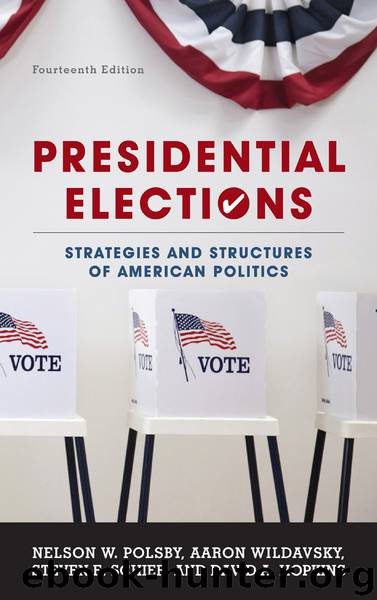Presidential Elections: Strategies and Structures of American Politics by Polsby Nelson W. Wildavsky Aaron Schier Steven E. Hopkins David A. & Aaron Wildavsky & Steven E. Schier & David A. Hopkins

Author:Polsby, Nelson W.,Wildavsky, Aaron,Schier, Steven E.,Hopkins, David A. & Aaron Wildavsky & Steven E. Schier & David A. Hopkins
Language: eng
Format: epub
ISBN: 9781442253667
Publisher: Rowman & Littlefield
CAMPAIGN PROFESSIONALS
Presidential candidates have never lacked for willing accomplices in their quest for office. In the first partisan election battle in American history, the election of 1800, the crucial New York campaign was led by Alexander Hamilton (for the Federalists) and Aaron Burr (for the Democratic-Republicans). With the resumption of party competition in the 1830s, campaign managers assumed primary responsibility for the conduct of the battle, a pattern that has continued to the present.
Modern campaigns have evolved into something qualitatively different from the pattern of the previous century. It is not the professionalization of the campaign that is new, for the old-time party managers were extremely interested in monetary rewards for their services, but the fact that consultants today are business professionals, not party professionals. The individuals who directed the first century and a half of presidential elections were closely tied to one or another of the political parties and were often part of the party structure. Moreover, the communications technologies and strategies at the disposal of modern consultants that can help them sell their candidates have transformed the entire process of running for the nation’s highest office.
In the nineteenth century, campaigns were often carried out by the party organizations. Nowadays, candidates must form their own campaign organizations. These are typically comprised of paid staff, including a campaign manager, consultants, ad makers, speechwriters, pollsters, and field organizers; volunteers; close advisers, often known as a “kitchen cabinet”; and a formal organization, typically consisting of a campaign committee and a finance committee. The paid staff surrounding a modern candidate is drawn from a population of people for whom electoral politics is a full-time career: they are campaign professionals.58
What is the nature of campaign professionals? In some ways, they are very different from the party professionals of earlier eras. The people who ran campaigns through the first half of the twentieth century generally were compensated by the spoils system: victorious candidates hired or appointed their supporters to a variety of government jobs. Those who run campaigns now are mostly compensated in salaries and fees for services, although some may receive positions in the White House or the executive branch if their candidate wins the election. Earlier generations of party professionals were mainly generalists. Now, the business of electioneering requires specialization and therefore diversity.59 The business of the campaign is carried out by staffers or subcontracted to firms that specialize in a particular aspect of the process: polling, advertising production, direct mail, opposition research, voter mobilization, data analysis, fund-raising, information technology, and so forth.
The professionalization of political campaigns has advanced, by all accounts, considerably further in the United States, with its long drawn-out nomination and election processes, than anywhere else among the world’s democracies. What is the cumulative effect of the introduction of modern polls, media campaigns, fund-raising efforts, and the people who run these operations on the conduct of the presidential campaign? Does the new agenda-setting mechanism of the opinion poll change the character and conduct of presidential campaigns? Have the campaign professionals
Download
This site does not store any files on its server. We only index and link to content provided by other sites. Please contact the content providers to delete copyright contents if any and email us, we'll remove relevant links or contents immediately.
The Secret History by Donna Tartt(19023)
The Social Justice Warrior Handbook by Lisa De Pasquale(12182)
Thirteen Reasons Why by Jay Asher(8882)
This Is How You Lose Her by Junot Diaz(6869)
Weapons of Math Destruction by Cathy O'Neil(6260)
Zero to One by Peter Thiel(5782)
Beartown by Fredrik Backman(5729)
The Myth of the Strong Leader by Archie Brown(5491)
The Fire Next Time by James Baldwin(5421)
How Democracies Die by Steven Levitsky & Daniel Ziblatt(5209)
Promise Me, Dad by Joe Biden(5139)
Stone's Rules by Roger Stone(5078)
A Higher Loyalty: Truth, Lies, and Leadership by James Comey(4945)
100 Deadly Skills by Clint Emerson(4910)
Rise and Kill First by Ronen Bergman(4772)
Secrecy World by Jake Bernstein(4736)
The David Icke Guide to the Global Conspiracy (and how to end it) by David Icke(4696)
The Farm by Tom Rob Smith(4500)
The Doomsday Machine by Daniel Ellsberg(4480)
